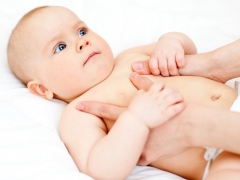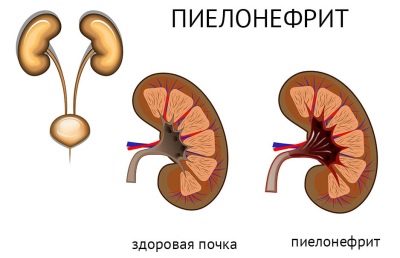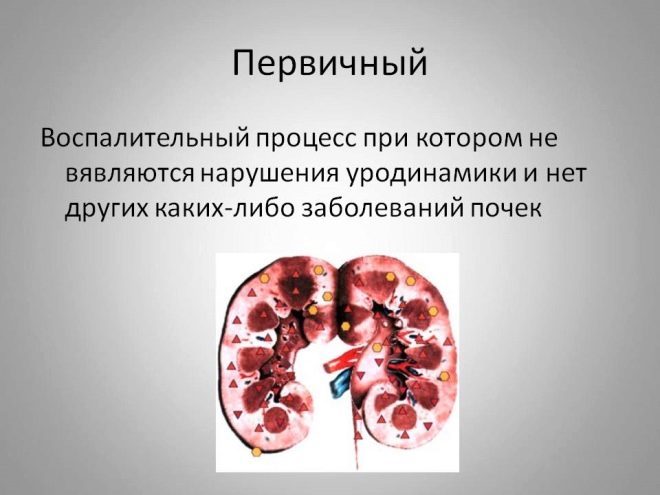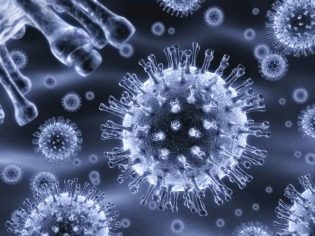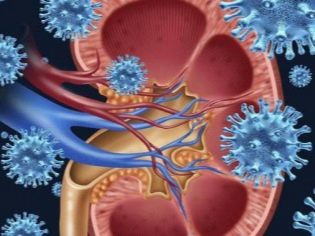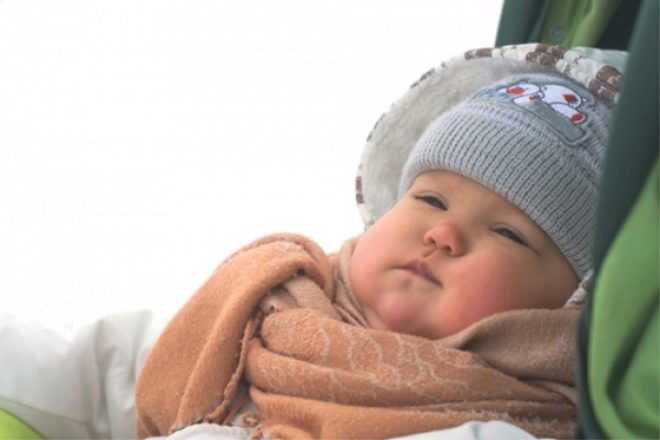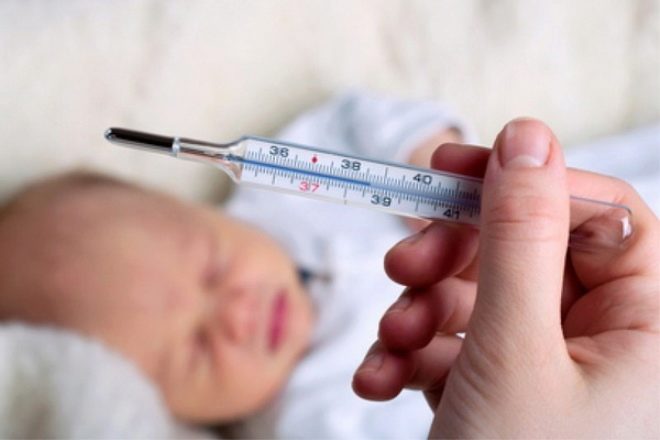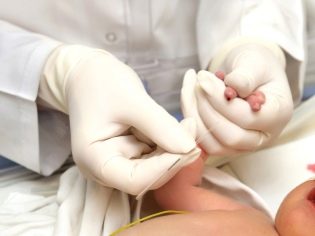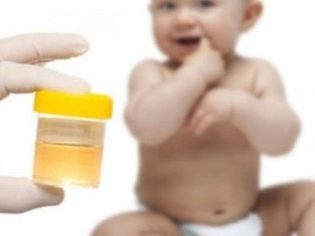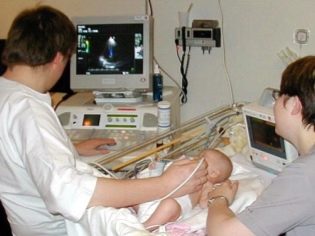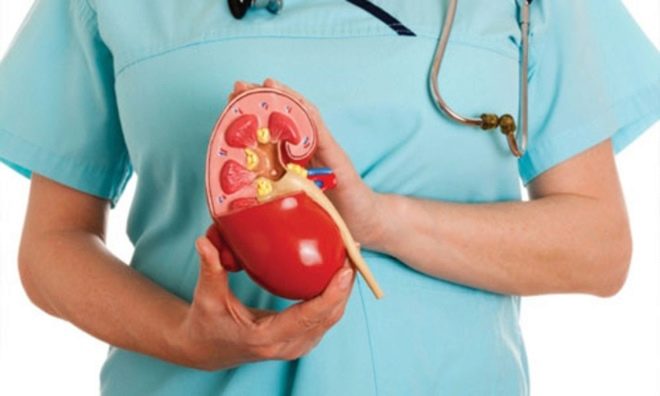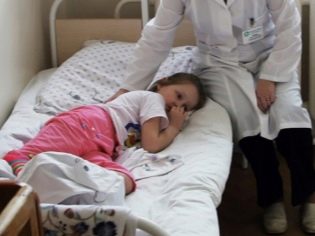Pyelonephritis in infants
Inflammatory pathologies of the upper kidney are found even in the smallest patients. The course of pyelonephritis in a newborn baby is quite heavy and requires careful monitoring. Late diagnosis and incorrectly chosen treatment contribute to the transition of the disease to the chronic form.
What it is?
Pyelonephritis is a disease in which the renal excretory function is impaired. This pathology can develop at any age: both in infants and in adults and adolescents. In very young children, pyelonephritis often proceeds in conjunction with cystitis, which gave grounds for doctors to use the term "urinary tract infection." The use of this term is not recognized by all specialists, however, it still exists in pediatric urological practice.
When pyelonephritis in children the cup-pelvis system and adjacent areas of the renal tissue are damaged. The renal pelvis is a structural formation in the kidney that is necessary for the accumulation and further discharge of the urine produced. Normally, they have the appearance of a funnel. In pyelonephritis, the renal pelvis changes its original shape and becomes very extended.
According to statistics, the registered forms of pyelonephritis begin to register in children already at the age of 6 months. Earlier cases of the disease are extremely rare, so they are considered not statistically significant. Girls suffer from pyelonephritis more often than boys. This feature is due to the presence of a shorter urethra, which contributes to a more intense spread of infection.
The reasons
Influence of various causal factors can lead to the development of inflammation in the kidneys in babies. If the cause of pyelonephritis is reliably established, then this form of the disease is called secondary, that is, developed as a result of some specific action of external or internal causes. To eliminate the adverse symptoms in this case, it is necessary to first treat the underlying pathology.
Primary pyelonephritis is a pathological condition that occurs for an unknown reason. Such forms are found in every tenth baby. Treatment of primary pyelonephritis is symptomatic.
To normalize the child's well-being, various medications are used, which are prescribed in a comprehensive manner.
Secondary pyelonephritis can be caused by:
- Viral infections. The originators of the disease are often adenoviruses, Coxsackie viruses, and also ECHO - viruses. Pyelonephritis in this case occurs as a complication of a viral infection. The duration of the incubation period of such forms of diseases is usually 3-5 days. In some cases, the disease may have a latent course and is not actively manifested.
- Bacterial infections. The most frequent pathogens are: staphylococcus, streptococcus, E. coli, Toxoplasma, Ureaplasma, Pseudomonas aeruginosa and other anaerobes. The course of the disease in this case is quite severe and proceeds with severe symptoms of intoxication.
To eliminate the adverse symptoms requires the appointment of antibiotics with urosepticheskim action.
- Congenital anomalies of development. Pronounced anatomical defects in the structure of the kidneys and urinary tract contribute to the violation of urine outflow.The presence of various strictures (pathological constrictions) in the cup-pelvis-plating system causes a violation of the excretory function.
- Severe hypothermia. The cold reaction causes a pronounced spasm of the blood vessels. This leads to reduced blood supply to the kidney and the disruption of its work.
- Chronic diseases of the gastrointestinal tract. The anatomical proximity of the kidneys to the abdominal organs causes their involvement in the process in various pathologies of the digestive system. Expressed intestinal dysbacteriosis is often a provoking cause of impaired metabolism.
- Gynecological diseases (in girls). Congenital abnormalities of the genital organs in babies often cause an upward spread of infection. In this case, the bacterial flora can enter the kidneys by penetrating the urinary tract from the vagina.
Symptoms in children under one year
Determining the clinical signs of pyelonephritis in infants is a rather difficult task. Often, it can occur in latent or latent form in children. Typically, such a clinical variant of the disease is detected only during laboratory tests.
If the disease proceeds with the development of symptoms, then it is possible to suspect pyelonephritis in a child by certain signs. These include:
- The appearance of fever. The body temperature of a sick child rises to 38-39 degrees. Against the background of such a fever, the baby has chills, and intoxication increases. Elevated temperatures persist for 3-5 days after the onset of the disease. In the evening, it usually increases.
- Behavior change. The child becomes less active, drowsy. Many kids are more asking for hands. Children in the first year of life in the acute period of the disease play less with toys, become more passive.
- Decreased appetite. The baby is poorly attached to the maternal breast or completely refuses breastfeeding. The long course of the disease leads to the fact that the child begins to lose weight.
- Discoloration of the skin. They become pale, dry. Hands and feet may be cold to the touch. The child may also feel chills.
- Frequent urination. In very young children, this trait can be traced during the change of diapers. If the diaper requires replacement too often, then this indicates that the baby has a urination disorder.
- Soreness when tapping in the lumbar region. Only a doctor can identify this symptom. This simple diagnostic test for quite a long time has been successfully used to detect pain in the projection of the kidneys. If the child has an inflammation in the kidneys, then during such an examination, he will cry or quickly change his position.
- Mood change. A newborn baby can't tell mom where he has a pain. All his complaints he shows only crying.
If the baby has pain in the kidneys or discomfort during urination, it will become more capricious and tearful. Any changes in the behavior of the baby should alert the parents and provide an opportunity to consult with your doctor.
Diagnostics
When the first signs of the disease appear, you should definitely show the baby to the doctor. You can first consult with the attending pediatrician, who observes the baby. However, urologists are involved in the treatment and diagnosis of pyelonephritis and other kidney diseases. The opinion of this specialist will be decisive in drawing up the tactics of therapy, especially if there are anatomical defects in the structure of the kidneys.
For diagnosis first, a clinical examination of the babyduring which the doctor identifies all the specific symptoms of the disease. Then the doctor will recommend an examination scheme, which includes the mandatory implementation of a general analysis of blood and urine.These simple and informative tests are necessary to establish the infectious forms of pyelonephritis.
Thus, in case of bacterial and viral pathologies of the kidneys, in the general analysis of blood, peripheral leukocytosis appears - an increase in the number of leukocytes. Also ESR increases, and normal indicators in a leukocytic formula change. In general, the analysis of urine also increases the number of leukocytes, changes in pH and color, and in some cases, the proportion. To establish the exact causative agent, urine sap is carried out with the obligatory determination of sensitivity to various antibacterial agents and phages.
Children with pronounced signs of pyelonephritis are also undergoing an ultrasound scan of the kidneys. This method allows to identify all the anatomical defects of the urinary organs that are present in a child, and also to establish the correct diagnosis.
This study is safe and does not cause any pain in the baby. Renal ultrasound is prescribed on the recommendation of a pediatrician or pediatric urologist.
To the use of other, more invasive diagnostic methods in infants of infancy most often do not resort. They are quite painful and can cause many complications in a child. The need for them is very limited. After conducting the full range of examinations and establishing an accurate diagnosis, the pediatric urologist prescribes the necessary treatment regimen for the sick child.
Treatment
The main goal of therapy is to prevent the transition of the process to a chronic course. Treat acute forms of pyelonephritis should be quite carefully. Only properly selected therapy and regular monitoring of its effectiveness will lead to the child's full recovery from the disease. Primary pyelonephritis with an unidentified cause that causes them is treated symptomatically. For this purpose, various drugs are prescribed to eliminate the adverse symptoms of the disease.
For the treatment of pyelonephritis in the youngest patients, the following methods are used:
- Organization of the correct mode of the day. The expressed symptoms of intoxication lead to the fact that the baby constantly wants to sleep. Do not limit it to this. To restore immunity, the child needs both night and full day rest. During sleep, the baby gains strength to fight the disease.
- Breast feeding on demand. It is very important that the baby receives all the necessary nutrients during the illness, which are fully contained in breast milk. To normalize the drinking regime of the child, you should additionally drink boiled water, cooled to a comfortable temperature.
Babies, receiving lures, as a drink fit various fruit juices and compotes, pre-diluted with water.
- Drug therapy. It is appointed only by the attending physician. For infectious forms of pyelonephritis, various combinations of antibiotics with a wide spectrum of action are used. Some of the antibacterial drugs, especially the older generations, have nephrotoxicity properties (damage renal tissue).
Independent administration of antibacterial agents for the treatment of pyelonephritis in newborns and babies is unacceptable.
- Phytotherapy. It is used in babies older than 6-8 months. Cranberries and cranberries are used as uroseptic medicinal plants. They can be used in the composition of various fruit drinks and compotes. These natural medicines have an excellent anti-inflammatory effect and are able to improve the performance of the kidneys.
- Vitamin therapy. Especially effective in children with congenital immunodeficiency states. Adding additional vitamins to a child's diet leads to a stronger immunity and helps to quickly restore the baby’s health.
Effects
Most cases of pyelonephritis in babies occur without significant complications.However, under certain circumstances, the disease becomes chronic. This is largely due to the incorrectly chosen treatment of the disease or the presence of chronic pathologies in the child, which can worsen the prognosis of the course of the disease.
Bacterial forms of pyelonephritis in infants require more careful monitoring. In severe cases, they can cause various dangerous complications - abscesses and suppuration of the renal tissue. These conditions lead to a marked deterioration of the condition and require emergency hospitalization of the baby in the hospital for emergency treatment.
Premature and weakened babies can carry pyelonephritis quite hard. In cases of severe immunodeficiency, they may develop bacterial sepsis - a massive spread of infection from the kidneys throughout the child’s body. This condition has a very unfavorable prognosis. Treatment of bacterial sepsis is carried out in the intensive care unit.
Prevention
The body of a newborn baby is very sensitive to various infections that can get into it from the outside. In order to avoid dangerous kidney diseases, it is very important to follow all sanitary and hygienic rules. While walking with your child on the street, try to choose clothes for the weather. It should be comfortable enough and not cause hypothermia or overheating in the baby.
Preservation of breastfeeding - It is very important for the proper operation of children's immunity. This helps the child get all the nutrients and vitamins necessary for his growth and development. Protective immunoglobulins contained in human milk protect the baby's body from various infections and improve its immunity parameters.
If a child has congenital abnormalities in the structure of the urinary system and kidneys, then from the very first months of life it must be observed at the urologist. These children undergo general clinical blood and urine tests. Such control helps prevent chronization of the process and the dangerous effects of pyelonephritis in later life.
All about urine analysis and treatment of urinary tract infections in children, see the following video.
